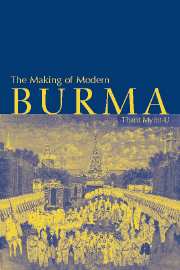Book contents
- Frontmatter
- Contents
- Acknowledgements
- Introduction: The fall of Mandalay
- 1 Kings and distant wars
- 2 The Irrawaddy valley in the early nineteenth century
- 3 The Court of Ava
- 4 Empire and identity
- 5 The grand reforms of King Mindon
- 6 Revolt and the coming of British rule
- 7 Reformists and royalists at the court of King Thibaw
- 8 War and occupation
- 9 A colonial society
- Conclusion: The making of modern Burma
- Bibliography
- Index
9 - A colonial society
Published online by Cambridge University Press: 05 June 2012
- Frontmatter
- Contents
- Acknowledgements
- Introduction: The fall of Mandalay
- 1 Kings and distant wars
- 2 The Irrawaddy valley in the early nineteenth century
- 3 The Court of Ava
- 4 Empire and identity
- 5 The grand reforms of King Mindon
- 6 Revolt and the coming of British rule
- 7 Reformists and royalists at the court of King Thibaw
- 8 War and occupation
- 9 A colonial society
- Conclusion: The making of modern Burma
- Bibliography
- Index
Summary
From the fall of Mandalay to the turn of the century, the Kingdom of Ava was reintegrated with its erstwhile southern frontier as well as its old imperial possession of Arakan. Together, they formed ‘Burma’. But in this process of reintegration, old royal structures and old aristocratic elites had no say. Instead, the web of institutions and processes which bound the new country together were fashioned in Rangoon and Calcutta, by British policy-makers, with little or no accommodation with the collapsed and largely discredited Konbaung regime.
The early colonial period in the Irrawaddy valley represented an end of attempts to reform the early modern state. As a consequence, many aspects of early modern social and economic organisation, already in decline, disappeared entirely. Existing institutions such as the Hluttaw were supplanted by an imported British Indian bureaucracy, and local offices, both hereditary and appointed, were largely extinguished. The changes were more than institutional, as they also led to a complete transformation in the rationale of government and the ceremonies and symbols used to legitimate state authority. Gone was the role of the state in supporting Buddhism and the Buddhist Sangha, as well as in patronising the cultural activities which made up Ava's ‘great tradition’. The British in India had, over the course of the late nineteenth century, attempted to invent a new ‘traditional’ place for their authority over local society. But practically no such effort was made in Burma, beyond a few court costumes retained for the governor's durbars and the creation of minor Burmese titles as rewards for service to the colonial Raj.
In some respects, however, colonial policies represented an intensification of trends already underway prior to annexation.
- Type
- Chapter
- Information
- The Making of Modern Burma , pp. 219 - 244Publisher: Cambridge University PressPrint publication year: 2001



